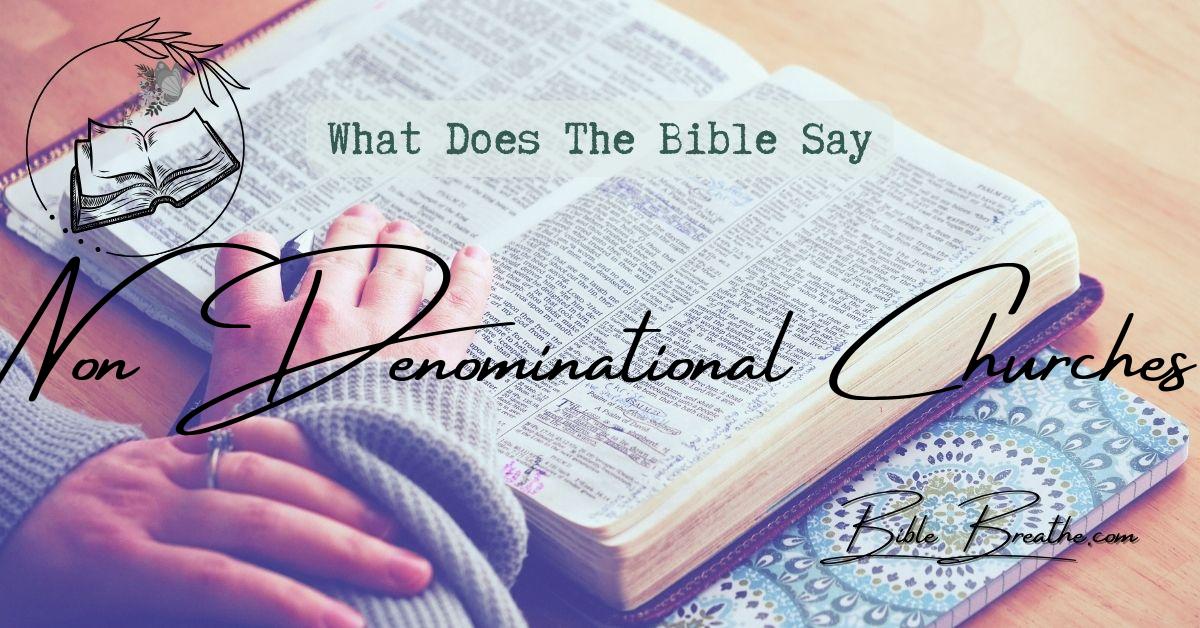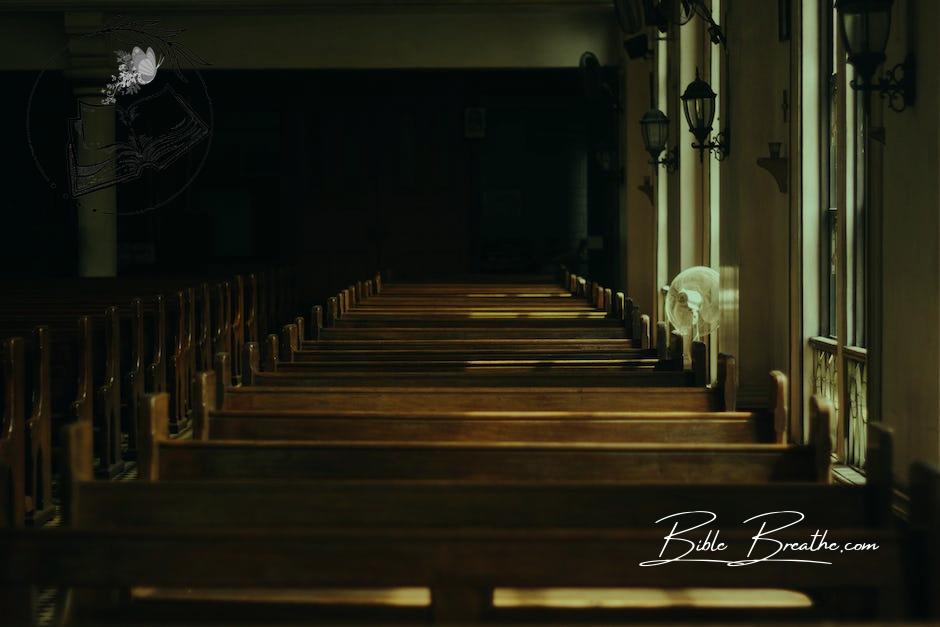What’s the Bible’s take on non-denominational churches?
Picture it: you’re in a bustling restaurant, and the menu offers an array of dishes, each with its unique flavor.
That’s like denominations in the Christian world—diverse and distinct.
Now, non-denominational churches?
They’re like that farm-to-table joint, serving a pure, unfiltered connection to God’s Word.
But does the Bible give a thumbs-up to this ‘off-the-menu’ approach?
In Scripture, you won’t spot the word ‘denomination,’ but you’ll find the Bible’s heartbeat—Christian unity.
The Holy Spirit’s the head chef, and the Gospel of Jesus Christ, the secret sauce—uniting us all.
We’ll break down worship styles, church setup, and the Bible’s stance on it all.
Dive in, and let’s unravel the Bible’s wisdom about this flavorful mix of denominations, non-denominational movements, and the harmony God intended for His people.🍽️🙏
Key Takeaways
- The Bible emphasizes Christian unity and fellowship as essential aspects of the faith. It encourages believers to come together, regardless of denominational labels, to worship God, study His Word, and support one another in faith.
- Non-denominational churches have risen in significance within modern Christianity. They often prioritize a focus on core Christian beliefs and practices while minimizing denominational distinctions. This approach resonates with many who seek a more straightforward and unified expression of their faith.
- The Bible’s overarching message promotes love, unity, and worship. It underscores the importance of love for God and one another, seeking unity in the body of Christ, and engaging in heartfelt worship that transcends denominational boundaries.
- While the Bible does not specifically mention non-denominational churches, its teachings provide a foundation for the principles that guide such congregations. The emphasis on faith in Jesus Christ, love for one’s neighbor, and the centrality of God’s Word align with the values of many non-denominational churches.
- Ultimately, the Bible’s message encourages believers, regardless of their church affiliation, to prioritize love, unity, and worship as they follow Christ and share the Gospel with the world. Non-denominational churches reflect a desire to focus on these core principles while embracing the diversity within the broader Christian community.
Demystifying Non-Denominational Churches
Photo modified by BibleBreathe.com. Original photo by Brett Sayles on Pexels
So, what’s the deal with non-denominational churches?
Well, let’s take a stroll and peel back the layers to uncover what makes these gatherings unique.
In non-denominational churches, it’s all about diving deep into the teachings of the Bible and figuring out how to make them part of your everyday life.
Decoding Non-Denominational Churches
Non-denominational churches, just as the name hints, are Christian communities that don’t hitch their wagon to any specific denomination or traditional church hierarchy.
Unlike denominational churches with their distinct beliefs and organizational structures, non-denominational folks prefer to keep things simple and flexible when it comes to worship and faith.
One of the standout features of non-denominational churches is their passion for Christian unity.
They aim to bring believers from all walks of life and various denominations together, united by their faith in Jesus Christ.
This welcoming approach creates a space where people from diverse backgrounds can come together to worship and strengthen their connection with God.
Bible Teachings and Down-to-Earth Guidance
At the core of non-denominational churches lies a profound commitment to the Bible’s teachings.
The scriptures aren’t just some dusty old books; they’re the go-to source for guidance and inspiration, both for individuals and the entire congregation.
This focus on the Bible often leads to a straightforward and practical approach to faith.
It’s not about getting lost in theological debates; it’s about using biblical principles to navigate the ups and downs of life.
“Thy word is a lamp unto my feet, and a light unto my path.” – Psalm 119:105 (KJV)
This verse sums up how important the Bible is in non-denominational churches.
It’s not just a spiritual textbook; it’s a trusty guide for making everyday decisions and facing life’s challenges head-on.
Non-denominational worship services often feature contemporary music and down-to-earth teachings.
They want to make sure that everyone can connect with the message.
Plus, they’re all about creating a tight-knit Christian community where believers can lean on each other as they navigate their own spiritual journeys.
In a nutshell, non-denominational churches are all about fostering Christian unity, diving deep into Bible teachings, and offering practical guidance for living out your faith.
These congregations provide a warm and inclusive space for believers to come together, learn, and grow in their relationship with Jesus Christ.
So, whether you’re a seasoned Christian or just dipping your toes in, you’ll likely find a welcoming home in a non-denominational church.
Navigating the Landscape of Non-Denominational Churches
Photo modified by BibleBreathe.com. Original photo by Nikko Tan on Pexels
Ever felt like you’re in a bustling city, trying to find your way through the maze of neighborhoods, each with its unique vibe?
That’s a bit like asking, “What does the Bible say about non-denominational churches?”
You see, Christianity is like a grand banquet with a variety of dishes, and each Christian denomination is like a different course in that feast.
The Christian Mosaic
Let’s take a quick tour through some of the major Christian denominations, each with its own distinct flavor:
Roman Catholicism
And I say also unto thee, That thou art Peter, and upon this rock, I will build my church; and the gates of hell shall not prevail against it.” – Matthew 16:18 (KJV)
Roman Catholicism, often associated with grand cathedrals and rich rituals, places great emphasis on tradition and the authority of the Pope.
Eastern Orthodox
“Teach me thy way, O Lord, and lead me in a plain path, because of mine enemies.” – Psalm 27:11 (KJV)
Eastern Orthodox Christianity, like a timeless icon, emphasizes mystical spirituality and holds a deep reverence for tradition.
Protestantism
For by grace are ye saved through faith; and that not of yourselves: it is the gift of God.” – Ephesians 2:8 (KJV)
Protestantism, rooted in Martin Luther’s Reformation, champions salvation by faith alone and emphasizes the authority of Scripture.
Baptist
Therefore we are buried with him by baptism into death: that like as Christ was raised up from the dead by the glory of the Father, even so, we also should walk in newness of life.” – Romans 6:4 (KJV)
Baptists place a strong emphasis on believer’s baptism by immersion and congregational governance.
Pentecostalism
And when the day of Pentecost was fully come, they were all with one accord in one place.” – Acts 2:1 (KJV)
Pentecostalism, like a spiritual wildfire, emphasizes the gifts of the Holy Spirit and lively worship.
Jehovah’s Witnesses
But ye shall receive power, after that the Holy Ghost is come upon you: and ye shall be witnesses unto me…” – Acts 1:8 (KJV)
Jehovah’s Witnesses are known for their door-to-door evangelism and distinctive beliefs, including the rejection of the Trinity.
Seventh-day Adventists
“Remember the sabbath day, to keep it holy.” – Exodus 20:8 (KJV)
Seventh-day Adventists observe the Sabbath on Saturday and emphasize healthy living.
Mormonism
“And if ye shall ask with a sincere heart, with real intent, having faith in Christ, he will manifest the truth of it unto you, by the power of the Holy Ghost.” – Moroni 10:4 (Book of Mormon)
Mormonism has unique scriptures like the Book of Mormon and emphasizes family and temple ordinances.
Unity in Christ’s Love
As you journey through these Christian neighborhoods, you’ll find both common ground and unique features.
Despite their differences, all denominations share a fundamental belief in Jesus Christ as Lord and Savior.
The Bible encourages believers to seek unity, as expressed in Ephesians 4:3 (KJV): “Endeavouring to keep the unity of the Spirit in the bond of peace.”
So, what does the Bible say about non-denominational churches?
It reminds us of the importance of unity in Christ while celebrating the beautiful diversity of Christian expression.
Think of it as a rich tapestry woven with various threads, where the body of Christ shines forth in all its multifaceted glory.
Exploring the Roots of Christian Diversity
Photo modified by BibleBreathe.com. Original photo by Luis Quintero on Pexels
Well, it seems like we’ve taken a detour here, diving into the historical origins and differences among major Christian denominations.
But let’s steer the ship back toward our quest to uncover what the Bible has to say about non-denominational churches.
1. Catholicism
Catholicism, one of Christianity’s ancient branches, goes way back to the early Christian church.
They’re all about the Pope, traditions, and teachings handed down through the ages.
You’ll find a strong focus on sacraments, Mary, and saints in the Catholic Church.
2. Protestantism
Fast forward to the 16th century, and you’ve got the Protestant Reformation shaking things up.
Martin Luther, John Calvin, and their crew challenged some Catholic doctrines and practices.
They’re all about Scripture as the top dog (sola scriptura) and salvation by faith alone (sola fide).
Lutherans, Presbyterians, and Baptists are part of this gang.
3. Orthodoxy
Over in the Eastern Roman Empire, you’ve got Eastern Orthodoxy, which sticks to its early Christian church roots.
They’re big on liturgical worship, icons, and those ecumenical councils.
Orthodoxy dances to its own theological tune, separate from Catholicism and Protestantism.
4. Anglicanism
Meanwhile, in England, Henry VIII had his own ideas during the English Reformation.
Anglicans kept some Catholic traditions, like liturgical worship and bishops, while also adding a dash of Protestant theology to the mix.
5. Non-Denominationalism
Now, let’s talk about non-denominational churches.
They’re a different breed.
Unlike the others with their denominational labels, non-denominational folks intentionally avoid tying the knot with a specific group.
They prefer a simpler, more adaptable approach to worship and faith.
Their MVP is the Bible, and they’re all about uniting Christians, regardless of denominational tags.
So, where does the Bible fit into all of this?
Well, the Bible doesn’t drop the mic on denominations or non-denominationalism.
But it does drop some wisdom on unity:
“That they all may be one; as thou, Father, art in me, and I in thee, that they also may be one in us: that the world may believe that thou hast sent me.” – John 17:21 (KJV)
This verse serves as a reminder of Jesus’ desire for unity among believers, no matter their denominational flavor.
It’s all about focusing on their shared faith in Christ and working together as part of the larger body of believers.
In a nutshell, while the Bible doesn’t have a dedicated section on denominations or non-denominationalism, it does emphasize the importance of unity among believers, something that non-denominational churches often put front and center in their faith and worship journey.
So, whether you’re in a traditional denomination or exploring the non-denominational path, unity in Christ is the name of the game.
The 20th-Century Revolution: Non-Denominational Churches
Photo modified by BibleBreathe.com. Original photo by Shelagh Murphy on Pexels
In the grand tapestry of Christianity, the 20th century witnessed something unique – the rise of non-denominational churches.
It’s like discovering freshly sprouted wildflowers in a carefully tended garden of faith.
To make sense of this modern twist in the age-old story of faith, let’s turn to the Bible and see what wisdom it offers about these intriguing congregations.
Unveiling the Reasons Behind Their Emergence
Non-denominational churches are a bit like wildflowers, breaking free from the structured rows of the garden.
Their growth can be attributed to several factors:
1. A Desire for Christian Unity
“That they all may be one; as thou, Father, art in me, and I in thee, that they also may be one in us: that the world may believe that thou hast sent me.” – John 17:21 (KJV)
This verse from John speaks of the yearning for Christian unity.
Some believers sought a church experience without the divisions of denominationalism.
2. A Return to Biblical Teachings
“Thy word is a lamp unto my feet, and a light unto my path.” – Psalm 119:105 (KJV)
Non-denominational churches often emphasize a direct connection with the teachings of the Bible, aiming to stay true to its principles.
3. A Focus on Christian Fellowship
“And let us consider one another to provoke unto love and to good works: Not forsaking the assembling of ourselves together…” – Hebrews 10:24-25 (KJV)
These churches prioritize warm, welcoming fellowship among believers, much like the early Christian gatherings.
4. A Variety of Worship Styles
“Make a joyful noise unto the Lord, all ye lands.” – Psalm 100:1 (KJV)
Non-denominational churches often embrace diverse worship styles, adapting to the cultural and generational preferences of their congregations.
The Pros and Cons of Non-Denominational Churches
Just as every coin has two sides, non-denominational churches come with their own set of advantages and challenges.
Pros:
- Flexibility: They can swiftly adapt to changing needs and cultural shifts.
- Emphasis on Biblical Teachings: A strong focus on the Bible can deepen spiritual understanding.
- Inclusive: These churches often welcome believers from various backgrounds.
Cons:
- Lack of Historical Tradition: Some miss the rich history and traditions found in denominational churches.
- Limited Oversight: The absence of denominational structure can make accountability challenging.
- Theological Diversity: Differences in interpretation may lead to theological tensions.
As we journey through the diverse landscape of Christianity, the rise of non-denominational churches reminds us of the ever-evolving nature of faith.
In a world where individual spiritual journeys are as unique as fingerprints, these congregations offer a fresh and adaptable approach to worship, reflecting the dynamic spirit of the 20th century.
The Bible’s Take on Non-Denominational Churches
Photo modified by BibleBreathe.com. Original photo by Pixabay on Pexels
Let’s dive into the Bible’s perspective on non-denominational churches.
We’re talking about unity among believers and the whole shebang of gathering for worship and fellowship.
Embracing That Christian Unity
The Bible’s all about unity among believers, no matter which Christian flavor they prefer.
Back in the early Christian days, unity was their jam.
I appeal to you, brothers and sisters, in the name of our Lord Jesus Christ, that all of you agree with one another in what you say and that there be no divisions among you, but that you be perfectly united in mind and thought.” – 1 Corinthians 1:10 (NIV)
This verse is like a neon sign saying, “Unity, folks!”
It pushes Christians to put aside their denominational tags and focus on their shared faith in Jesus Christ.
Gathering for a Good Ol’ Worship and Fellowship
The Bible doesn’t stop there; it also throws in the importance of gathering for worship and fellowship.
Non-denominational churches love this stuff.
“For where two or three gather in my name, there am I with them.” – Matthew 18:20 (NIV)
Here’s Jesus, reminding us that when believers get together, it’s like He’s right there in the mix.
Whether you’re in a formal denomination or chilling in a non-denominational setting, Christ’s presence is right there with you.
And if you need a historical example, look no further than the book of Acts, where the early Christians were all about gathering for worship, teaching, and some good ol’ fellowship:
“They devoted themselves to the apostles’ teaching and to fellowship, to the breaking of bread and to prayer.” – Acts 2:42 (NIV)
This passage is like a snapshot of early Christian life.
They were all about learning, hanging out, sharing meals, and praying together.
In a nutshell, the Bible’s take on non-denominational churches lines up with its focus on unity among believers and the importance of getting together for worship and fellowship.
While denominations might have their quirks, the Bible’s core message is clear: Christians, come together in the name of Jesus Christ, and let that unity and community flourish, no matter what’s on the denominational menu.
Two Paths in Christianity: Non-Denominational vs. Denominational Churches
Photo modified by BibleBreathe.com. Original photo by Breakingpic on Pexels
In the grand story of Christianity, two unique paths have unfolded: non-denominational and denominational churches.
Picture them as two branches from the same tree, sharing common roots but yielding different fruit.
Let’s dive deep into this contrast and see what wisdom the Bible has to offer about these approaches.
Unveiling the Differences in Beliefs, Structure, and Practices
Non-Denominational Churches
“Now I beseech you, brethren, by the name of our Lord Jesus Christ, that ye all speak the same thing, and that there be no divisions among you…” – 1 Corinthians 1:10 (KJV)
Non-denominational churches often prioritize unity by steering clear of formal affiliations with denominational traditions.
They focus on a simple, Bible-centered approach to faith, aiming to eliminate divisions among believers.
Denominational Churches
“For there must be also heresies among you, that they which are approved may be made manifest among you.” – 1 Corinthians 11:19 (KJV)
Denominational churches, on the other hand, are like diverse branches on the tree of Christianity.
They often have established creeds, doctrines, and hierarchical structures that set them apart.
The Role of the Holy Spirit in Guiding Churches
“But the Comforter, which is the Holy Ghost, whom the Father will send in my name, he shall teach you all things…” – John 14:26 (KJV)
Both non-denominational and denominational churches recognize the guidance of the Holy Spirit.
Non-denominational churches may emphasize a more personal, spontaneous experience of the Spirit, while denominational churches often follow structured rituals and liturgy.
The Harmony of Christian Unity and Denominational Differences
The Bible encourages unity among believers, as expressed in Ephesians 4:3 (KJV): “Endeavouring to keep the unity of the Spirit in the bond of peace.” Regardless of their differences, both non-denominational and denominational churches share a common commitment to Christ.
Non-Denominational Churches:
- Pros: Emphasis on simplicity, unity, and direct connection to biblical teachings.
- Cons: May lack the historical and theological depth found in denominational traditions.
Denominational Churches:
- Pros: Rich theological heritage, structured worship, and a sense of continuity with Christian history.
- Cons: May face challenges in achieving full unity with other denominations.
As we navigate these two distinct paths within Christianity, it’s crucial to remember that both non-denominational and denominational churches contribute to the rich tapestry of faith.
They are like different instruments in a grand symphony, each playing a unique role in glorifying God.
Ultimately, the Bible’s message is clear: let love and unity in Christ transcend denominational boundaries, for in Him, we find our common ground.
Embracing the Blessings of Non-Denominational Churches
Photo modified by BibleBreathe.com. Original photo by Lukas on Pexels
Non-denominational churches bring a unique flavor to the table, and they’ve got some distinct blessings that folks seeking a flexible and personal connection with Jesus Christ often appreciate.
Let’s unpack these goodies.
1. Worship Your Way
Non-denominational churches are like a buffet of worship styles.
Unlike traditional denominations with their set rituals, these churches have the freedom to mix it up.
They adapt their worship to cater to the tastes and needs of their members.
That means you’re in for a dynamic and contemporary worship experience.
In non-denominational gatherings, you might find yourself in the groove of heartfelt, expressive worship.
Modern music, prayers that speak to today’s issues, and spontaneous moments of faith expression are all on the menu.
No rigid traditions here – it’s all about helping individuals connect with God in their own unique way.
2. Get Personal with Jesus
Now, here’s the good stuff.
Non-denominational churches shine when it comes to fostering a personal relationship with Jesus Christ.
The Bible itself encourages us to get cozy with our Savior, and non-denominational folks take that to heart.
“Draw near to God, and he will draw near to you.” – James 4:8 (ESV)
This verse is like an open invitation from God Himself.
Non-denominational congregations make it a priority to help you get up close and personal with Jesus.
They want you to dive into your spirituality, build a direct connection with the Savior, and transform your faith.
In these churches, you’re encouraged to dive into the Bible on your own, pray like it’s a heart-to-heart conversation, and seek guidance from the Holy Spirit in your daily life.
The spotlight is on your individual spiritual journey, which can lead to a deeper, more authentic relationship with God.
So, there you have it.
Non-denominational churches offer the blessings of worship freedom and a strong focus on that one-on-one connection with Jesus.
It’s all about making faith your own, just like God intended.
So, if you’re looking for a faith journey that’s flexible and deeply personal, non-denominational congregations might be calling your name.
Frequently Asked Questions (FAQs) About What Does The Bible Say About Non Denominational Churches
What are the core beliefs of non-denominational Christians?
Non-denominational Christians emphasize a personal relationship with Jesus Christ, a strong belief in the Bible, and often reject formal creeds or specific doctrines, prioritizing a simpler, more direct approach to faith.
How do non-denominational churches differ from traditional denominations?
Non-denominational churches typically avoid strict denominational affiliations and focus on a broader Christian message.
They have less formal structure and tend to be more flexible in their worship and teachings, emphasizing a personal relationship with Jesus rather than denominational doctrines.
What is the Bible’s view on denominational affiliations?
The Bible emphasizes unity among believers but doesn’t explicitly endorse specific denominations.
It encourages love, understanding, and fellowship among Christians despite doctrinal differences, focusing on the core principles of faith, love, and the teachings of Jesus Christ.








